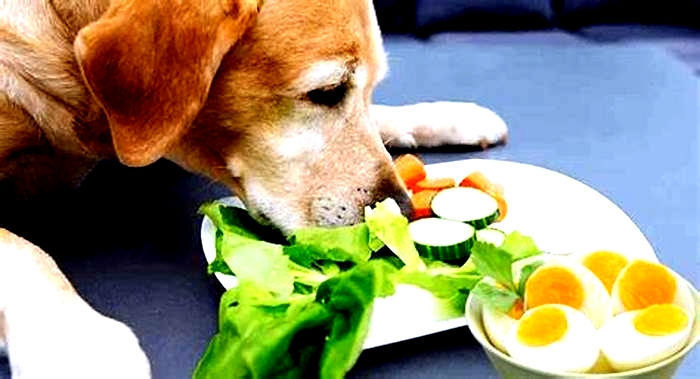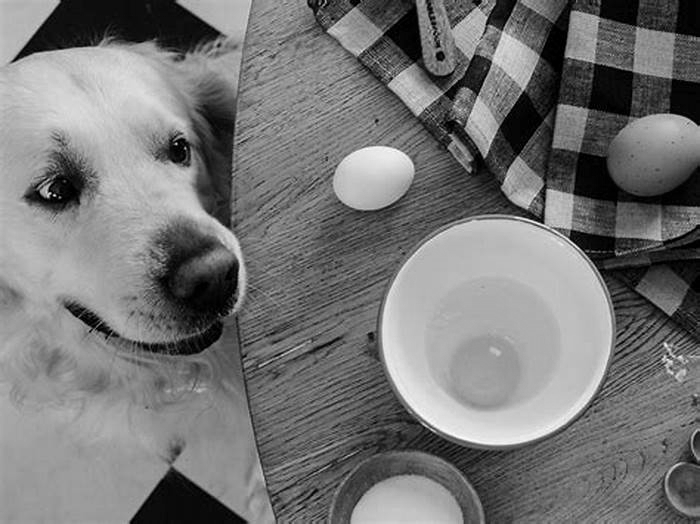Can dogs eat eggs

Can Dogs Eat Eggs?
When dogs were in the wild, they could snatch eggs out of birds nests and eat them raw. Today, dogs dont need to hunt for their own food, but eggs still provide a good amount of protein for dogs. As long as eggs are consumed safely, they can make excellent treats or dietary supplements for dogs.
Are Eggs Good for Dogs?
Eggs can be a great source of nutrition for dogs. They are high in protein, fatty acids, vitamins, and fatty acids that help support your dog, inside and out.
Remember that eggs are only as good as the chicken they come from. Try to feed your dog eggs that are from free-range farm hens fed an organic diet. If you can get them from a trusted source, that is ideal. Just like us, chickens are as healthy as what they eat, and healthier chickens lay healthier, more nutritious eggs.
Before feeding your dog eggs, talk to your vet. Some dogs with medical conditions shouldnt eat eggs, so always check first. Consuming too many eggs can also lead to health problems like obesity, so talk to your vet about the appropriate amount of eggs to feed your dog.
With that said, sometimes eggs can be used to help settle upset stomachs. Also, its not a good idea to use eggs as your dogs main meal. But when served cooked, eggs can be a great occasional treat.
How Can Eggs Help Dogs?
Eggs provide important minerals and vitamins for dogs, including:
- Iron
- Fatty acids
- Folate
- Protein
- Riboflavin
- Selenium
- Vitamin A
- Vitamin B12
These nutrients and vitamins help support your dogs overall health, as well as their skin and coat.
Can I Feed My Dog Raw Egg?
Most veterinarians recommend cooking eggs fully before feeding them to your dog.There are a few concerns about feeding raw eggs to dogs that owners should be aware of, including:
- Salmonella: Dogs may be at risk of coming into contact with salmonella bacteria when eating raw eggs or other raw foods. Owners who feed raw eggs to dogs could also be exposed to salmonella. If a dog eats an egg contaminated by salmonella, they could get an infection called salmonellosis. The symptoms of salmonellosis include fever, vomiting, diarrhea, and lethargy.
- Biotin deficiency: Feeding raw eggs can lead to biotin deficiency, as egg whites contain avidin, an enzyme that prevents the absorption of biotin in the body. Biotin is a vitamin that supports healthy skin, metabolism, cells, and digestion. Biotin deficiencies are rare in dogs, but they can happen.
- Bacteria: As eggs go bad, they can grow bacteria that can harm your dog.
Dogs can also be allergic to various sources of protein, including eggs. Watch your dog for any symptoms of an allergic reaction, including sneezing, swelling, hives, problems breathing, lethargy, or coughing.
Before feeding raw eggs to your dog, talk to your vet.
What to Do if Your Dog Eats Raw Egg
If your dog eats raw egg, monitor them for any problematic symptoms, including the symptoms of salmonellosis. Its also a good idea to chat with your vet and take your dog in for a check-up, just in case.
Can Dogs Eat Eggshells? Are Eggshells Nutritious for Dogs?
Before giving your dog eggshells, talk to your vet first. Eggshells contain calcium, which some dogs may need to be supplemented in their diets. However, there are easier ways to give your dog more calcium, and eggshells arent the tastiest option. Plus, egg shells have sharp edges that can hurt your dogs throat or internal organs.
Eggshells can help older, arthritic dogs. Eggshell membranes significantly reduced joint pain and improved joint function in 51 dogs experiencing a range of joint problems, according to a 2016 study. If your dog has arthritis, your vet may recommend supplements or medication to help their symptoms.
How to Safely Feed Your Dog Eggs
Eggs should be cooked before being given to a dog. Cook or boil eggs plain, without oil, butter, salt, seasoning, spices, or other additives. It doesnt matter how your dog likes their eggs sunny side up, scrambled, or hard-boiled as long as they are fully cooked. There are several ways to integrate eggs into your dogs diet, from the occasional bite of hardboiled egg to sprinkled scrambled eggs on top of dog food.
Start by feeding your dog just one egg. Watch them for any signs of gastrointestinal distress, like diarrhea or vomiting. As long as they dont show any digestive discomfort, you should have no trouble giving them eggs.
Can Dogs Eat Eggs?
Ever wonder if you can feed your dog eggs as a treat?
It turns out that not only can dogs eat eggs, they are totally amazing for your pup and letting your pet have their own breakfast omelet wont hurt anybody.
Benefits of eggs for your dog
There are multiple health benefits dogs can reap from chowing down on an egg.
Eggs are a great source of protein and fatty acids, Dr. John Sangiorgio, a veterinarian from CompeteCare Veterinary Center in New York City, told The Dodo.
Plus, they can help calm your dogs stomach down if he has an upset tummy.
Eggs are also great for your pups skin and coat because theyre full of fat-soluble vitamins like Vitamin A.
How your dog can safely eat eggs
When it comes to preparing eggs for your dog, the only thing you really want to do is make sure theyre fully cooked.
Serve your dog whatever style of eggs he prefers (or that you happen to be cooking); slices of hard boiled eggs or soft scrambled ones are equally great. Also leave out any spices and make sure any eggs your feed your pet are completely plain, because dogs dont do well with all spices (and theyll enjoy it just fine without)!
Can dogs eat eggs regularly?
When it comes to eggs, you might be wondering about the cholesterol in them but, surprisingly, that isnt going to be an issue.
Since a normal dog's cholesterol is well over 200 you don't have to worry about raising that, Dr. Sangiorgio said.
What you should watch, however, is if your dog begins gaining too much weight from consuming eggs if youre not sure, you can check with your veterinarian to see how many eggs your individual pup can have daily.
In moderation, however, eggs are a great snack to feed your dog.
Can Dogs Eat Eggs?
Many pet parents wonder which human foods are good for their pets. A common question that I get from pet parents at my animal hospital is: Can dogs eat eggs?
Heres everything you need to know about the nutritional value of eggs for dogs.
Are Eggs Good for Dogs? Can Dogs Eat Cooked Eggs?
The answer is yes, cooked eggs are good for dogs! Dogs can eat hard-boiled or scrambled eggs. The main objective is that the eggs need to be cooked. Do not feed raw eggs to dogs.
Eggs are good for dogs as they provide an excellent source of fatty acids, vitamins, minerals, and protein.
Essentially the entire egg, including the eggshell, can be nutritious for dogs.
Can Puppies Eat Eggs?
Yes, puppies can eat eggs. Eggs offer the same nutritional value for puppies as they do for adult dogs.
Are Raw Eggs Good for Dogs?
There is no nutritional benefit in feeding raw eggs to dogs.
There is, however, the risk of your dog contracting Salmonella infection from a raw egg. This bacterial infection can cause vomiting and diarrhea.
For more information on egg safety, please refer to Centers for Disease Control and Prevention;this information on Salmonella applies to people and animals.
Can Some Dogs Be Allergic to Eggs?
Dogs tend to be allergic to proteins in food. Since eggs have protein, dogs can become allergic to eggs.
Signs that your dog is having an allergic reaction include gastrointestinal (GI) issues like vomiting and diarrhea. Sometimes they can have skin issues like itchiness around the ears, paws, and other areas.
If you see any of these signs, seek help from your local veterinarian. For more information about food allergies in dogs, please refer to Cummings Veterinary Medical Center at Tufts University.
Why Are Eggs Good for Dogs? What Are the Health Benefits?
Each part of a cooked egg offers health benefits for dogs: the egg yolk, eggshell, and egg white.
Egg Yolks Contain Fatty Acids and Vitamins
Dogs need fatty acids and vitamins, and egg yolks provide both.
Fatty Acids
Fatty acids are concentrated in the egg yolk.
Fatty acids are consumed as saturated and unsaturated fats in a dogs diet. A dogs body breaks down the fat, and it is absorbed through the GI tract.
Once inside, fatty acids are used to build and maintain body cells.
Fatty acids also provide a delivery system for fat-soluble vitamins. Dogs are not predisposed to heart disease like people, so we dont worry about their cholesterol.
Vitamins
Vitamins are consumed as water-soluble and fat-soluble nutrients in a dogs diet.
Vitamins serve as catalysts and building blocks in metabolism, immune function, growth, and development.
These vitamins are concentrated in the egg yolk:
Vitamin A
Vitamin D
Vitamin E
Vitamin K
Vitamin B1
Vitamin B6
Vitamin B12
Riboflavin
Niacin
Folic acid
Choline
Eggshells Contain Necessary Minerals
Minerals are also necessary for dogs, and theyre consumed as salts in a dogs diet.
They serve as catalysts and building blocks in metabolism, immune function, growth, and development.
These nutrients are concentrated in eggshells but also found in egg whites and yolks:
Calcium
Phosphorus
Magnesium
Sodium
Potassium
Chloride
Iron
Copper
Zinc
Manganese
Selenium
Iodine
Egg Whites Provide Amino Acids
Dogs need amino acids. Amino acids are consumed as meat and plant-based protein in a dogs diet.
A dogs body breaks down the protein, and it is absorbed through the GI tract. Once inside, the protein is used to build and maintain muscles.
These nutrients are concentrated in the egg white:
Arginine
Histidine
Isoleucine
Leucine
Lysine
Methionine
Phenylalanine
Threonine
Tryptophan
Valine
How Much Egg Can a Dog Eat?
Eggs can be great as special treats for your dog.
The average egg contains 60 calories and has roughly 6 grams of protein and 4 milligrams of fat.
To figure out how much to feed your dog, you should talk with your veterinarian. The appropriate serving size of eggs as treats for your dog will depend on a variety of factors, including:
Size
Age
Activity level
Existing health issues
How to Feed Eggs to Your Dog
The safest way to feed eggs to your dog is to hard boil them and chop them up. Its safest to feed eggs to your dog immediately after cooking.
Store eggs at 40F when raw and boil eggs at 160F to properly cook them. If youre not serving them right away, it is recommended to refrigerate them at 40F until ready to serve.
Featured Image: iStock.com/MeePoohyaphoto
SaveSave
Can Dogs Eat Eggs?
Eggs are full of protein and essential amino acids. We know eggs are utterly delicious and nutritious for us humans which is why they feature so often in our breakfasts sunny side up, boiled or scrambled. But how about our four-legged companions? Are eggs good for dogs too? Keep reading to find out.
Can dogs eat eggs?
Yes, dogs can eat eggs. Although it is not recommended to feed your dog eggs every day, they should not cause harm as the occasional treat. While eggs are full of nutrients, these are not necessary for your pets diet as they will get everything they need from a high quality, complete dog food.
As with everything you feed your dog, moderation is key, so make sure youre not overfeeding your pet. Eggs can be prepared in so many delicious ways: hardboiled, poached, scrambled. Unfortunately, we cant ask our canine friend directly how they like their eggs, but we do know how healthy each method of cooking eggs is. From raw to boiled, here is what you need to know about feeding eggs to your pet.
Can dogs eat raw eggs?
Do not feed your dog raw eggs. One of the main risks of feeding raw eggs is potential Salmonella infection. These bacteria can live on the shell as well as inside the egg and while its relatively rare in the UK, its better not to risk this.
Biotin deficiency is another potential consequence of feeding your dog raw egg whites on a long-term basis. Biotin is otherwise known as Vitamin B7 and plays a role in maintaining healthy skin, supporting cell growth and supporting your dogs metabolism. A protein called avidin, found in raw eggs, can bind biotin and reduce your pets intake of this vitamin. The cooking process deactivates avidin, which is why cooked eggs do not cause biotin deficiencies.
For these reasons, it is always better to feed your dog cooked rather than raw eggs.
Can dogs eat scrambled eggs?
Scrambled eggs are ok as an occasional treat, as long as you offer them plain scrambled eggs, without any added salt, pepper or butter. This means that you should avoid sharing your breakfast with your pet, as its likely to contain seasoning we humans enjoy, but that can be detrimental to your pets health.








